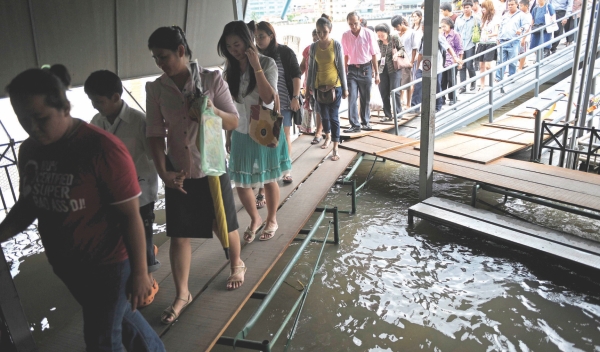| Home - Back Issues - The Team - Contact Us |
 |
| Volume 10 |Issue 39 | October 14, 2011 | |
|
|
International
Wet, Sticky and Dodgy in Thailand AHMEDE HUSSAIN For any South-East Asian country today, devastating floods are an unmitigated nightmare. For Thailand, it is that and something else again. Political divisions in Thailand remain so wide that even an apolitical disaster like floods can produce endless squabbling over the actual or greater cause. It is almost enough to make some policymakers appear oblivious to the plight of the people affected. For weeks now, flooding in parts of Thailand has gone from bad to worse. For a new prime minister, not being seen to attend to the hardship of the people would be tantamount to a dereliction of duty. Conversely, to be seen to do so could cultivate valuable political capital. Thus, a visiting Malaysian delegation, invited recently to Bangkok and scheduled to pay a courtesy call on Prime Minister Yingluck Shinawatra, had to meet her deputy instead. Yingluck, we were told, had to attend to the flood situation elsewhere in the country. So, our delegation of senior business and media people arrived at the office next door instead, to meet Deputy Prime Minister Kittiratt na Ranong. The visit had apparently been planned by the former government of then premier Abhisit Vejjajiva. After an election that came and went, along with Abhisit's government, our visit continued with the successor administration.
By then, the buzz in Bangkok was that the government of novice premier Yingluck was being led by "three prime ministers": Yingluck, her deputy, and her elder brother and former premier Thaksin Shinawatra. That situation surely cannot help Thailand solve any of its outstanding problems, natural or political. To whatever extent it might be true, it could only add to those problems. Neighbouring Cambodia did not overcome any of its internal problems when it had two prime ministers in the 1990s. But all that today would be for Thailand and its present leaders to resolve. So our delegation did not fail to appreciate that we were at least meeting the Deputy Prime Minister. Kittiratt was also the Commerce Minister, so the seasoned entrepreneurs in our group could also get to grips with a Thai leader on trade and investment issues. Kittiratt was genial and affable, knowledgable in his field and enthusiastic about the future of bilateral business relations. The former business veteran and president of the Stock Exchange of Thailand also happened to have old family ties with some Malaysians in Penang. But although Kittiratt was probably best suited among government leaders to meet our delegation, he was not the Deputy Prime Minister. He was a Deputy Prime Minister, since Yingluck had appointed five Deputy Prime Ministers to help her run the country. Also, much of the promise in what he envisioned in expanded bilateral business relations relied on Yingluck's election promises. And the other buzz in Bangkok at the time was that not all the pledges could be fulfilled because of the Thai economy's material limitations. Thailand has one of the largest populations among Asean countries, but its economy is not the most dynamic. Even the vibrancy of Bangkok has lately shifted from its business roots to a political base, and a disturbingly divided base at that. Meanwhile, although pockets of promise exist for improved business ties, so do areas of industrial competition. There is for example scope for Malaysians to explore steel production in Thailand, but there is competition in exporting automobiles, a related industry, to third and fourth countries. Still, little of this nitty-gritty surfaced during our formal exchanges. It was after all a courtesy call, an occasion for expressing goodwill and a nicety or two. Throughout this time, however, pressure had been building up on the government over its slow pace of delivery. Late last week, labour and student groups protested against the incomplete implementation of a promised Bt300 (US$9.70) per day minimum wage. Yingluck had announced the wage hike for the country, but so far it has happened in only seven of the 76 provinces. Rice farmers are also uneasy because the government's subsidy scheme may not work as well as its predecessor's income guarantees. Floods have also delayed the delivery of the new scheme, while rising production costs are increasingly squeezing farmers. The bloody feud between Red Shirt and Yellow Shirt demonstrators also threatens to return. Last Sunday, some Red Shirt leaders were upset that several senior army officers who had cracked down on them were being promoted. At the same time, Yellow Shirts are anxious that the government is facilitating Thaksin's return with an amnesty for his crimes. The pro-Thaksin Nitirat group of legal scholars is seeking to expunge all judicial decisions following the 2006 military coup. Meanwhile, Thaksin's (former) brother-in-law is set to assume the post of police chief. To add to the uncertainty, a key figure in the 2006 coup has warned that another coup is possible if the government places Thaksin's interests above the people's. Former foreign minister, military officer, palace insider and head of the National Security Council Prasong Soonsiri has warned that government-orchestrated pressure to help Thaksin return without serving his jail sentences could trigger another coup. Through it all, what could most unsettle Yingluck's government could be the "unpolitical" flood situation itself. In Bangkok alone, flood warnings yesterday stated that nine more areas of the city could experience overflows. It is harder to explain to people that a local flood situation is as uncontrollable as the devastation wreaked by a global economy. Thais could come to think that a government unable to control rising damp is unfit to govern through all the other issues.
Copyright
(R) thedailystar.net 2011 |

